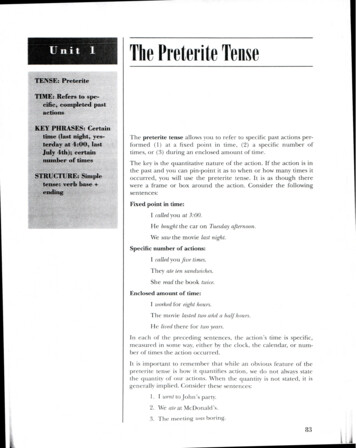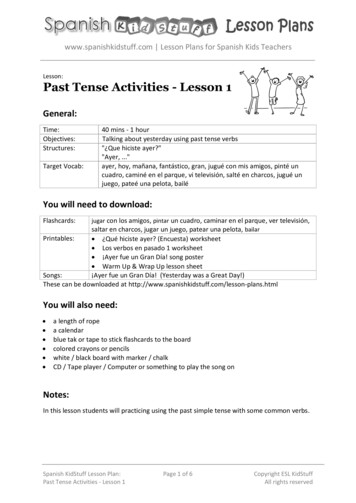
Transcription
Unit1The Preterite TenseTENSE: PreleriteTIME: Rt fers to spe cific, compleled pastactionsKEY PHRASES: Certamlime (last night, yes terday at 1:00, lastJuly 4th); certainnumber of timesSTRICTI RE: Simpletense: verb base endingThe preterite tense allows you to refer to specific past actions per formed (1) at a fixed point in time, (2) a specific number oftimes, or (3) during an enclosed amount of time.The key is the quantitative nature of the action. If the action is inthe past and you can pin-point it as to when or how many times itoccurred, you will use the preterite tense. It is as though therewerea frame or box around the action. Consider the followingsentences:Fixed point in time:I called you at 3:00.He bought the car on Tuesday afternoon.We saw the movie last night.Specific number of actions:I called you five times.They ate ten sandwiches.She read the book twice.Enclosed amount of time:I zvorked for eight hours.The movie lasted two and a half hours.He lived there for trvo years.In each of the preceding sentences, the action's time is specific,measured in some way, either by the clock, the calendar, or num ber of times the action occurred.It is important to remember that while an obvious feature of thepreterite tense is how it quantifies action, we do not always statethe quantity of our actions. When the quantity is not stated, it isgenerally implied. Consider these sentences:1. I ri'cw;'to John's party.2. We a/ at McDonald's.3. The meeting juas boring.83\\i
84Spanish Verb TensesIn the first two sentences, the implication is that the person performed the action once. In thethird, the implication is that the enUre meeting, from beginning to end, was boring.A good test for determining if a sentence is in the preterite is to consider if it is reasonable toask "For how long?" or "When?" the action took place.For example, if someone tells you, 'John called me," you can reasonably ask, "WTien?" andexpect a specific answer. But if this person says, 'John used to call me several dmes a day," youprobably would be wasting your time if you asked ivhen.In other words, 'John called me" is in the preterite, while 'John used to call me several times aday" is not (this latter sentence is in the imperfect tense, which will be discussed in the next unit).Regular Verbs in the PreteriteTo form regular verbs in the preterite you do the following:-ar verbs: drop the -ar and add the following endings:(/ spoke, you spoke, etc.)-e-asteyo hable nosotros hablamos-amos-asteistu hablastevosotros hablasteisel hablo ellos hablaron-6 -aronNote that the nosotros form is identical in the preterite and the present tenses for -arverbs.examples:Yo hable.Hablamos con Juan.We spoke with John.I spoke.Tti miraste la pelicula.You watched the movie.Vosotros comprasteis palomitas.You bought popcorn.Ella me llamo tres veces.Ellos contaron el dinero.She called me three times.They counted the money.-er and -ir verbs: drop the -er or -ir and add the following endings:(I ate, you ate, etc.)1-itnosisteyo comi nosotros comimos-isteisio-ierontii comiste vosotros comisteisel comio ellos comieron(/ opened, you opened, etc.)yo abri nosotros abrimostii abristevosotros abristeisel abrio ellos abrieronNote: Most stem-changing verbs change only in the present tense (not in the preterite), e.g.,contar (to count): yo cuento (I count); 310 c.onle (I counted). The exceptions to this are -ir stemchanging verbs, and are discussed under irregular verbs, on page 88.examples:Escribi una carta./ zvrote a letterComimos pizza.We ate pizza.
The Preterite Tense 85Vendiste tii casa. Rompisteis las ventanas.You sold vour house. Von broke the winckjws.Ella bebio tres vasos de leche. Ellos abrieron las cajas.She c/rrtnA'three glasses of milk.They «/J w«/the boxes.Before working with the preterite, it is important to be familiar with the more common preterite"markers," or words and phrases that indicate specific time frames. Several are listed below.ayer yesterday la semana pasada last weekanoche last night el mes (ano) pasado last month (year)esta mafiana this morning hace agoesta tarde this afternoon ayer por la manana/tarde yesterday morning/afternoonPara ti, cual es verdadcro o fal» o?'1. Hable por telefono ayer por la tarde.2. Comi una ensalada anoche.3. Abri las ventanas en mi casa hace dos horas.4. Mire la television anoche.5. Bebi jugo de naranja esta mahana. 6. AsistI a la escnela la semana pasada.'7. Compre un coche el aho pasado.8. Vendi mi casa el mes pasado.ejercicio1-1-11. I bought a shirt yesterday.2. Y jLi studied last nisiht.3. She worked for two hours.4. We washed tlie dishes.5. They sang five songs.6. I ran to the corner.7. Yon wrote a letter.8. She opened the door.9. We didn't open those windows.
86 Spanish Verb Tenses10. They sold the car.11. We danced the tango last night.12. They spoke with the owner.13. I took a shower this morning.14. You washed your hair.15. They went to bed at eleven-thirty.;Te toea a ti!Responde, am frases complelas, a las siguientes pregunUis:1. ;Hablaste por telefono anoche?2. ;D6nde te compraste la camisa?3. iQue comiste anoche?4. ;Que recibiste para tu liltimo cumpleaiios?5. [Escuchaste la radio hoy?6. (jTomaste cafe ayer por la mahana?7. Bailaste el fin de semana pasado?8. Estudiaste espahol el aho pasado?Orthographic Changes in Regular VerbsThere are three standard orthographic (spelling) changes in Spanish which affect verbs in thepreterite as well as in other tenses. In the preterite, these changes occur only in the first personsingular yo form. They are as follows:1. verbs ending in -gar: insert a u before the e: yo Uegue (1 arrived)2. verbs ending in -car: the c changes to qu before the letter e: yo practique (1 practiced)3. verbs ending in -zar: the z changes to c before the letter e: yo empece (1 began)The reason for the first two changes is phonetic: in order to retain the original hard g and csounds, the letter u is inserted (the letters g and c are soft before the vowels e and i). In the lastchange it is because the letter z n(wer directly precedes the leUer e in Spanish (except in rarecases when ze are the first two letters of a word).Some frequently used \ erbs in these categories, with the preterite yo form:Uegar to arrive yo Ueguejugar to play (a game) jojuguef
The Preterite Tensesegarto pay (for)to water (a plant)to mow (grass, etc.)tragarto swallowvagarto wanderpagarregaryo pagueyo regueyosegueyo tragueyo vagueaparcarto parkbuscarto look for, searchclarificarclasificarto clarifyto classifydestacarto stand outempacarto packjustificarpracticaryo empaqueto justifyto practiceyojustifiqueyo practiquesacartocarto take out, take a pictureto touch, play (an instrument)yo toqueautorizarto authorizeyo autoricecomenzarto commence, beginyo cotnenceempezarto beginyo empeceorganizarto organizeto prayyo orgamcerezaryo aparqueyo husqueyo clarifiqueyo dasifiqueyo destaqueyosaqueyo recesimbolizarto symbolizetrazaryo simboliceto tracetropezarse (con)to bump (into)yo traceyo me tropeceRemember: Only verbs in the jioform are affected by these orthographic changes.ejercicioII-I-21. I pracdced the piano for an hour.2. I arrived at two o'clock.3. I organized the party.4. I began to dance on the table.5.I played the guitar for two hours at the reception.6. I played tennis with the pro {el jugadorprofesiirnal).7. I took twenty pictures of my cat.8. I authorized the purchase.9. I classified the information.87
88 Spanish Verb Tenses10. I bumped into your hotise's step (elpeldano).11. 1 parked the car in a prohibited space.12. I never stood out in English for ni)- pronunciation.13. I swallowed the medicine without thinking.14. I paid the gas bill.15. I watered my friend Lola's plants.Final note: WTiile these three types of verbs do not exactly follow the regular pattern of formingthe preterite tense, they are still considered regular verbs in the preterite because these changesoccur at all times in all tenses.Irregular Verbs in the PreteriteThere are several irregular verbs in the preterite. While patterns do emerge and the endingsare similar, it is important to understand the various types of conjugations.The following eleven verbs all take this set of endings:-e-imos-iste-isteis-o-ieron1. andar to walkanduv-2. estar to beestuv-3. tener to havetuv-anduve; anduviste; anduvo . . .estuve; estuviste; estuvo . . .tuve; tuviste; tuvo .4. caber to fitcuphub-hube; hubiste; bubo .5. haber auxiliary, to have6. poder to be able to7. poner to put, place8. saber to know9. hacer to make, dopudpussuphic-cupe; cupiste; cupo .pude; pudiste; pudo . . .puse; pusiste; puso .supe; supiste; supo .bice; hiciste; hizo . . .10. querer to wantquis-quise; quisiste; quiso .11. venir to comevin-vine: viniste: vino .Note:1. Verbs 1-3 take the letter uv in the new stem; 4-8 take a ;/,ͣ and 9-11 take an /.2. The only exception above is the third person singular of Jiaa'r, which is hizo. (The r changesto z to avoid the k sound.)3. There are no accent marks on these irregular endings.4. For their full conjugations, consult the preterite verb chart in the appendix.
The Preterite TensePara ti, cual es verdadero o falso?1. Tuve una fiesta hace dos semanas.2. Anduve a la escuela esta mahana.3. Anoche no pude dormir.4. No hice nada aver.5. Alguien vino a mi casa el fin de semana pasado.6. Fuse los zapatos en el armario anoche.7. Estuve increiblemente enfermo/a ayer.8. Anduve al cine esta semana.ejercieioII-1-.51. I walked to the store.2. He came to my party.3. Last night I couldn't sleep.4. They had an accident last Tuesday.5. We made the beds this morning.6. When did you know (find out) the answer?7. Yoti {pi fam.) were here for no more than ten minutes.8. I put the clothes in the closet.9. What did you do last night?10. They had to work for ten hcjurs yesterday.11- I put on my shoes.12. We were there for half an hour.13. Who made these invitadons?14. She didn't come to the meeting because she had an accident.89
90 Sjjanish Verh Tenses15.1 was in the store for twentv minutes and then I came here.jTe toca a ti!I Que hicisle ayer'? List ten things that you did yesterday:2.3.4.5.6.7.8.9.10.Ser and ir:The preterite conjugations for ser and ir are identical. But don't worry, becausethe context will carry the desired meaning, and ser is used less often than frin the preterite.irser(I xuas, you were, etc.)(/ zoent, you went, etc.)fuifuifuistefuefuimosfuisteisfueronll-l-l1. I went to the game.2. I was president of the club for one year.3. He went to the store (in order) to buy eggs.4. "V\Ti\' did you go away?fuistefuefuimosfuisteisfueron
The Preterite Tense915. They didn't go yesterday because they went last week.6. We didn't go to the wedding.7. Did you [pi. fam.) go to school today?8. Who was the big winner yesterday?9. The party was terrible.10. The meeting was/went well.11. Anita and Pepe were boyfriend/girlfriend (novios) for two years, but they never went to Venice.12. He was my best friend for ten years.13. We went separately {por separado) to the same store.14. Where did you {pi. form.) go last night?It was a disaster!15. How was the party?Decir and traer:The verbs decir (to say, tell) and traer (to bring) are conjugated as follows:decirtraer(Isaid/told, you said/told, etc.)dijedijistedijodijimosdijisteisdijeron(/ Irrought, you brought, etc.)trajetrajimostrajistetrajisteistrajo .trajeronVerbs related to, and conjugated in the same manner as traer:katraerto attractdistraerto distractretraerto bring back, dissuadesus traerto remove, take away(atraje, etc.)(distraje, etc.)(retraje, etc.)(sustraje, etc.)
Orthographic Changes in Regular Verbs. There are three standard orthographic (spelling) changes in Spanish which affect verbs in the preterite as well as in other tenses. In the preterite, these changes occur only in the first person. singular yo form. They are as follows: 1. verbs endi










